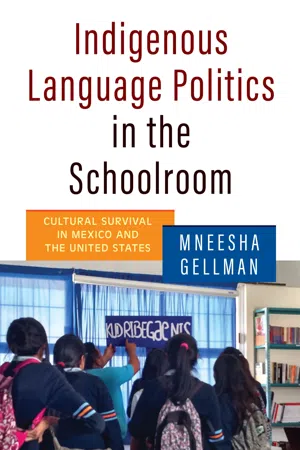
Indigenous Language Politics in the Schoolroom
Cultural Survival in Mexico and the United States
- 304 pages
- English
- ePUB (mobile friendly)
- Available on iOS & Android
Indigenous Language Politics in the Schoolroom
Cultural Survival in Mexico and the United States
About This Book
Public school classrooms around the world have the power to shape and transform youth culture and identity. In this book, Mneesha Gellman examines how Indigenous high school students resist assimilation and assert their identities through access to Indigenous language classes in public schools. Drawing on ethnographic accounts, qualitative interviews, focus groups, and surveys, Gellman's fieldwork examines and compares the experiences of students in Yurok language courses in Northern California and Zapotec courses in Oaxaca, Mexico. She contends that this access to Indigenous language instruction in secondary schooling serves as an arena for Indigenous students to develop their sense of identity and agency, and provides them tools and strategies for civic, social, and political participation, sometimes in unexpected ways.Showcasing young people's voices, and those of their teachers and community members, in the fight for culturally relevant curricula and educational success, Gellman demonstrates how the Indigenous language classroom enables students to understand, articulate, and resist the systemic erasure and destruction of their culture embedded in state agendas and educational curricula. Access to Indigenous language education, she shows, has positive effects not only for Indigenous students, but for their non-Indigenous peers as well, enabling them to become allies in the struggle for Indigenous cultural survival. Through collaborative methodology that engages in research with, not on, Indigenous communities, Indigenous Language Politics in the Schoolroom explores what it means to be young, Indigenous, and working for social change in the twenty-first century.
Frequently asked questions
Information
Table of contents
- Cover
- Title Page
- Copyright
- Dedication
- Contents
- List of Abbreviations
- Acknowledgments
- 1. Contemporary Culturecide: Why Language Politics Matters for Youth Participation
- 2. Collaborative Methodology: Research With, Not On, Indigenous Communities
- 3. Language Regimes, Education, and Culturecide in Mexico and the United States
- 4. Weaving Resistance: Zapotec Language Survival in Teotitlán del Valle, Oaxaca, Mexico
- 5. “My Art Is My Participation”: Language and Rights in Oaxaca de Juárez, Mexico
- 6. Like Water Slipping Through Cracks in a Basket: Teaching and Learning Yurok at Hoopa Valley High School, California
- 7. “We Are Still Here”: Navigating Cultural Rights and Discrimination at Eureka High School, California
- Conclusion. Advocating for Multilingual, Pluricultural Democracy
- Appendix 1. Informational Letter for Students, Parents, Guardians, and Community Members
- Appendix 2. Permission Form
- Appendix 3. Examples of Qualitative Interview Questions for Research
- Appendix 4. Examples of Focus Group Questions
- Appendix 5. Survey, English Version for Use in Language Classes (V1)
- Appendix 6. Discussion of Survey Data in Relation to Language and Identity
- Notes
- References
- Index